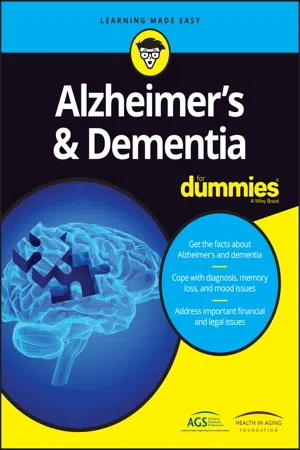
Alzheimer's & Dementia For Dummies
- English
- ePUB (mobile friendly)
- Available on iOS & Android
Alzheimer's & Dementia For Dummies
About This Book
Your sensitive, authoritative guide to Alzheimer's and dementia
If a loved one has recently been diagnosed with dementia or Alzheimer's disease, it's only natural to feel fraught with fear and uncertainty about what lies ahead. Fortunately, you don't have to do it alone. This friendly and authoritative guide is here to help you make smart, informed choices throughout the different scenarios you'll encounter as a person caring for someone diagnosed with dementia or Alzheimer's disease. From making sense of a diagnosis to the best ways to cope with symptoms, Alzheimer's and Dementia For Dummies is the trusted companion you can count on as you navigate your way through this difficult landscape.
Affecting one's memory, thinking, and behavior, dementia and Alzheimer's disease can't be prevented, cured, or slowed—but a diagnosis doesn't mean you have to be left helpless! Inside, you'll find out how to make sense of the symptoms of dementia and Alzheimer's disease, understand the stages of the illnesses, and, most importantly, keep your loved one safe and comfortable—no matter how severe their symptoms are.
- Find out what to expect from Alzheimer's and dementia
- Discover what to keep in mind while caring for someone with Alzheimer's or dementia
- Uncover symptoms, causes, and risk factors of Alzheimer's and dementia
- Learn the critical information needed to help manage these illnesses
Whether you're new to caring for a person affected by Alzheimer's or dementia or just looking for some answers and relief on your journey, this is the trusted resource you'll turn to again and again.
Frequently asked questions
Information
Getting Started with Alzheimer’s and Dementia
An Overview of Dementia and Alzheimer’s Disease
Defining the Relationship between Dementia and Alzheimer’s Disease
Understanding what dementia is
- Syndrome: This word describes the symptoms that together are characteristic of a particular medical condition. People with the condition have most of these symptoms but don’t have to show all of them to receive the diagnosis. Thus with dementia, one person may have poor memory and language but still have judgment enough to not walk out into a busy road, whereas another may have problems with both memory and judgment but have no changes in language skills.
- Chronic and progressive: These terms mean that the condition is ongoing long term and gets steadily worse with time. Many people think that the word chronic means that something is severe. Although dementia may be severe for some people, it’s mild in others; chronic here means long-lasting.
- Consciousness: Used in relation to dementia, this word takes on both of its meanings. People with dementia are both awake (as opposed to unconscious) and mentally aware of their surroundings, although what’s going on around them is confusing to them.
Grasping what dementia is not
- All old people get dementia. Although the chances of developing dementia do increase as people get older, it’s not a normal part of the aging process. In the United States, 1 in 9 people older than 65 and 1 in 3 older than 85 suffer from it.
- Dementia is the same as Alzheimer’s disease. Alzheimer’s disease is just one of a number of brain diseases that lead to dementia.
- Memory loss equals dementia. Dementia does affect memory, but for someone to be diagnosed with the condition, he needs to show many other more complex symptoms rather than simply poor memory alone.
- Everyone with dementia becomes aggressive. Even though some people with dementia can become agitated, aggression isn’t a universal feature of dementia and is usually triggered by the way someone is treated or communicated with rather than being a symptom of the dementia alone.
- A diagnosis of dementia means a person’s life is over. Despite the fact that the condition is chronic and progressive, many medical, social, and psychological treatments and strategies are available to help make life as fulfilling as possible for someone with dementia, for many years.
- Everyone with dementia ends up in a nursing home. Although one-third of people with dementia do eventually need this level of intense care in the later stages of their condition, many people are able to access enough help and support to stay in their own homes.
- My aunt has dementia, so I’m going to get it too. Some forms of dementia do have a genetic component and may run in families, but these are in the minority. For most people, it doesn’t follow that because a relative has dementia, they’ll get it too. And contrary to what one patient thought, you can’t catch it from your aunt either.
Understanding what Alzheimer’s disease is
Seeing what AD is not
- Curable
- Contagious
- A natural part of the aging process
- Something you get from using deodorant or cooking in aluminum pans
- Inevitable if you live long enough

